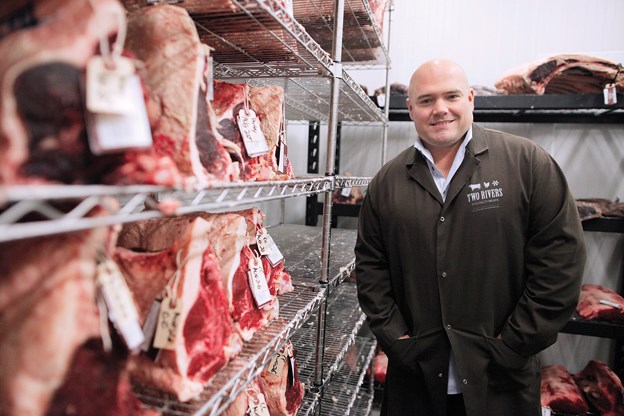I have noticed that reading a menu in a restaurant these days has become a time-consuming undertaking. In many establishments, menus read like shopping lists, with the names of food suppliers appearing front and centre in the description of dishes.
Does this trend point to the inevitable, insidious conclusion of modern consumerism? Does our food require prominent branding, even on a restaurant menu, to persuade us that Product A is better than Product B? Or is there another phenomenon at play here, perhaps something less sinister?
To research the answers to these questions, I spent a recent morning with Jason Pleym, whose Two Rivers Specialty Meats in North Vancouver bridges the gap between small B.C. farms and numerous restaurants around the city. Many of the meat products from the Two Rivers inventory are named on Vancouver dinner menus. Anyone who dines out regularly will likely recognize names like Sloping Hills Pork, Pemberton Meadows Natural Beef, or Yarrow Meadows Duck. That’s because Pleym and his team of passionate and socially and environmentally conscious carnivores have worked hard to share the stories of these limited-production, local farms with the Vancouver market.
Two Rivers buys the small supply of meats produced by a dozen or so local farms and, through dry aging, skilled butchery, and ingenious curing techniques, transforms it into highly sought-after raw cuts and ready-to-eat products.
Naming a Two Rivers partner farm on a menu is good for a restaurant’s business, not just because the products they supply are of an increasingly recognized and consistently high quality, but also because the farms themselves exhibit a tireless commitment to ethical and sustainable practices. These practices resonate with chefs and consumers looking for alternatives to mass-produced, “factory meat” products.
“Nine times out of 10 on a menu you don’t know where the meat is coming from,” says Pleym. “ The sales guy can’t tell you, the company can’t tell you because they just don’t know.”
Pleym and his wife began Two Rivers Specialty Meats back in 2007 with a view to demonstrating to chefs and diners that it was possible, even preferable, to be able to reliably trace the origins of the meat products we consume. They have carefully chosen the partner farms that supply the store based on a set of criteria that includes the absence of hormones or antibiotics, the ethical treatment of livestock (which usually involves free roaming and normal socializing behaviour for the animals), and sustainable farming practices that seek to minimize the operation’s environmental footprint. Many times, they will buy 100 per cent of a farm’s supply, enabling them to consistently trace every step of the farming process and build long-term relationships with small suppliers whose products might not otherwise reach a mainstream audience.
The rapid growth of the company suggests that the Pleyms have tapped into a strong appetite in the market. Their headquarters, featuring a full-wall welcome message that reads “Nice to meat you,” is currently in expansion mode, increasing their butchery, storage, and sales capacities. I am heartened that the business has enjoyed such success, not only because it suggests that Vancouver is perhaps ready to embrace a new model of ethical and responsible farming, but also because, from a purely indulgent perspective, the meat is delicious. Two Rivers dry ages their meat, removing much of the water, resulting in robust, flavourful products that don’t lose half their size when cooked.
Operations like these, which source limited quantities of top quality, responsibly produced meats, can make a positive impact in their regional markets. However, the increasing global demand for meat cannot be met through boutique suppliers alone. Rather than attempting to rise to the occasion and meet global demand through mass production, perhaps an alternative approach might be considered: reduce how much meat we eat. For the local, small-scale farming model to work everywhere, consumers must first be willing to change their habits. On the surface, it may seem counterintuitive for a purveyor of meats to suggest that we need to eat less of it, but Pleym believes that if we are to affect real change in our relationship with the natural world, we need to curb our persistent tendency to give in to our every craving or indulge our need for instant gratification.
“Habits absolutely need to change,” says Pleym. “We consume a lot more than we need and the stuff that we do consume is easy, fast and convenient. What are the implications of easy, fast and convenient? Mass production and volume.”
Despite a small, direct-to-consumer sales program (available by special order only), the vast majority of Two Rivers products are still only available at restaurants around the province. All the more reason to go out for dinner, in my opinion.
Chris Dagenais served as a manager for several restaurants downtown and on the North Shore. His regular column, The Dish, appears in the Wednesday issue of the North Shore News and online at nsnews.com. Contact: [email protected].



